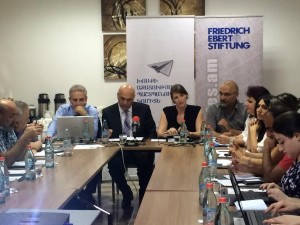 Committee to Protect Freedom of Expression, with the assistance of Friedrich Ebert Foundation, organized a round-table discussion on the topic “Insult and Defamation in media publications: the Armenian judicial practice and European Court cases” on September 16 at Congress Hotel Yerevan. Attending the discussion were journalists, media experts, human rights activists, representatives of international organizations.
Committee to Protect Freedom of Expression, with the assistance of Friedrich Ebert Foundation, organized a round-table discussion on the topic “Insult and Defamation in media publications: the Armenian judicial practice and European Court cases” on September 16 at Congress Hotel Yerevan. Attending the discussion were journalists, media experts, human rights activists, representatives of international organizations.
Julia Bläsius, Director of Friedrich Ebert Foundation South Caucasus Office, welcomed the participants and underscored the format of the discussion in terms of bringing up the issues of the mass media and development of professional skills of journalists. She stressed that the key purpose of Friedrich Ebert Foundation is to promote democracy in all kinds of countries. “On the one hand, the freedom of expression is a human right but, on the other hand, the media is an important institution, like the democratic political system because it can take up the function of controlling of the other political institutions. Armenia, and unfortunately Armenia is not a single case in this, we have two problems when we talk about this kind of topics. One is the legal framework, giving the ground for independent media or limiting independent media activity, but also the political-economic situation that, of course, kind of influences the media.”
The moderator Ashot Melikyan, chairman of CPFE, reminded how the legislative amendment decriminalizing insult and defamation, unlike the optimistic expectations, became a real challenge to the media. “Politicians, entrepreneurs perceived objective criticism as insult and defamation and tried to take revenge on the media through lawsuits,” Ashot Melikyan said, supporting his words with statistics: 17 such lawsuits were reported in 2010, 37 in 2011, 17 in 2012, 24 in 2013, 22 in 2014 and 9 lawsuits in the first half of 2015. “All in all, since the decriminalization of insult and defamation 126 lawsuits were filed against the media and journalists in different courts of different instances,” the chairman of CPFE informed. In his opinion, most of them were filed in an attempt to put pressure on, to silence the media.
Ara Ghazaryan, an expert on the European Convention on Human Rights, dwelling on the court cases of 2010-2015, reminded that a panic started in this sphere immediately after the decriminalization of insult and defamation. “There seemed to be a decision up there to close some media. The court granted claims for 1, 2, even 6 million drams. This caused a strong publish backlash, the ombudsman applied to the Constitutional Court, the Constitutional Court made a decision, after which the application of the law changed abruptly. The number of lawsuits against the media decreased.” According to Ara Ghazaryan, while in 2010-2011 the claimants got 2-3 million drams, after the decision of the Constitutional Court it became more difficult to defeat the media, hence the temptation to extort millions diminished.
The expert dwelt on the decision of the European Court on the case Delfi v Estonia according to which the media are responsible for insulting or defamatory comments made on their websites by readers. Afterwards, he informed that the Media Ethics Observatory has drawn up guidelines for the Armenian media on how to avoid a repetition of Delfi v Estonia in Armenia. “The main formula that the Armenian media should learn from this case is as follows: the media are exempt from liability for comments by other authors containing obvious hate speech, insult only if they can prove that they were unaware and could not have known about the existence of such comments.”
Ara Ghazaryan referred to several court cases which cause legal uncertainty. According to the lawyer, today a person can spread information from one’s own house but at the same time it is impossible to sue him or her because he or she is not a legal entity. Ara Ghazaryan also gave examples of how hate speech which has no legal safeguards in international and national law was defined by the Armenian court as a value judgment.
After the presentation the participants discussed the issues raised, including removal of comments from a website, spreading materials containing insult, defamation under a nickname, as well as intervention in the freedom of journalists.
Lilit Hovhannisyan
CPFE Expert











